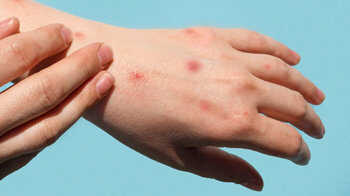
SVMC: Update on Monkeypox
 |
| Monkeypox causes blisters and often flu-like symptoms. It's spread through physical contact. |
BENNINGTON, Vt. -- At the beginning of June, when the first cases of monkeypox were being reported in the United States, I wrote an article about the top 10 things to know.
While much of the information I shared before is still relevant, cases in the United States are now in the thousands, rather than the hundreds. The infection reached Vermont last week. And this week, the United States declared it a health emergency, which will open access to resources to help quell the spread. It's time for an update. Here's what you need to know now.
What is monkeypox?
Monkeypox is a virus similar to smallpox, only much less severe. While it is a serious health issue, it is not typically deadly or debilitating long term. It can be more serious for immune-compromised people, those who are pregnant, and children under age 8.
Where did it come from?
Monkeypox is not new. It was discovered in monkeys in 1958 and for the first time in humans in the 1970s. It has been endemic in some African countries since then. Only recently has the virus spread to countries around the world.
How does it spread?
The virus spreads through contact with body fluids, monkeypox sores, or shared items (such as clothing, bedding, or utensils) that have been contaminated with fluids from sores of a person with monkeypox. Monkeypox virus also spreads during sexual contact with an infected person and may spread between people through respiratory droplets. Scientists are evaluating data to learn more about other ways monkeypox may spread.
Currently, the virus is spreading predominantly among men who have sex with other men. Because it spreads through skin-to-skin contact, droplets, and potentially other ways, it is not considered a sexually transmitted infection.
What are the symptoms?
Symptoms include flu-like symptoms, swelling of the lymph nodes, and a characteristic blister-like rash on the face and body. Some people also report headache, back pain, muscle aches, or fatigue.
What should I do if I think I might have monkeypox?
If you have an unexplained rash or sores on your skin, call your healthcare provider. Also call your healthcare provider if you have been exposed to someone with monkeypox. If you don't have a healthcare provider or insurance, call 211 to be connected to healthcare services.
What will happen next?
Your healthcare provider will determine if you have monkeypox or if you have been exposed.
- Healthy people who are determined to have monkeypox will be asked to isolate from other people and animals until symptoms have resolved and the sores have healed. The virus is self-limiting, which means it resolves on its own, usually within two to four weeks.
- An antiviral medication is available for those who have monkeypox and who are at high risk for a serious case. It comes with serious side effects, so it is not recommended for anyone except those at greatest risk for serious illness.
- Those who are exposed but who have no symptoms will be given a two-dose vaccine for smallpox. While monkeypox and smallpox are not the same, the smallpox vaccine has been shown to prevent symptoms in those exposed to monkeypox.
-
Those 55 and older may have received a smallpox vaccine during vaccination efforts that eradicated the disease and may, according to some stu
dies, have partial immunity to monkeypox, though the immunity can be widely variable person to person. One study showed that the smallpox vaccine prevented severe symptoms, but did not prevent symptoms entirely, in those vaccinated years or even decades earlier.
Should I get vaccinated for monkeypox?
Not yet. The state of Vermont and SVMC are working on getting the vaccine to patients who have been exposed, because being vaccinated after an exposure can prevent symptoms. As supply increases, we look forward to providing smallpox vaccines to more people.
Right now, medical professionals locally and statewide are working to develop screening, treatment, and vaccine processes for monkeypox. We hope that this work, federal funding and support, and public awareness will keep this monkeypox outbreak small. We have every expectation that it will.
For more information, visit the Vermont Department of Health website about monkeypox. If you have other questions about monkeypox, email them to wellness@svhealthcare.org.
Dr. Marie George is an infectious disease specialist at SVMC Infectious Disease, part of Southwestern Vermont Medical Center and Southwestern Vermont Health Care, in Bennington.
Tags: SVMC,






















